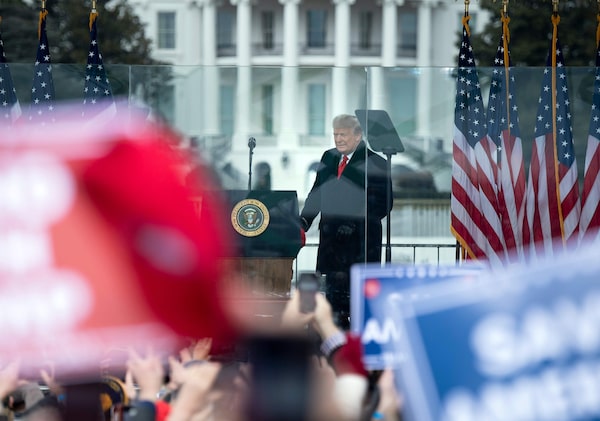
U.S. President Donald Trump speaks to supporters from The Ellipse near the White House on Jan. 6, 2021.BRENDAN SMIALOWSKI/AFP/Getty Images
David Moscrop is the author of Too Dumb for Democracy?: Why We Make Bad Political Decisions And How We Can Make Better Ones.
There are few grand myths born in the last 200 years that are as insidious as American exceptionalism.
Amorphous and malleable according to the political needs of the day, the idea often expresses whatever it is those who deploy the phrase prefer. But its manifestations tend to go something like this: the United States of America, this revolutionary democracy, is a special polity – the standard bearer of liberty and justice, the shining city on a hill, a beacon of freedom at home and abroad. Accordingly, at least two unquestionable axioms accompany this exceptionalism. The first: what America does abroad is good and necessary, even if it’s a tad messy. The second: whatever nastiness, misfortune or misdeed that might be happening in some other sorry place at some other sorry time could never happen here, not in America.
And yet, after nearly 250 years as a republic, the country has witnessed just such things, time and time again: slavery, violence, revolt, civil war, foreign war, extreme inequality, toxic polarization, constitutional paralysis and on goes the list to include a strongman president and an attempted coup.
Donald Trump is a norm-breaking, populist authoritarian whose approach to governing borders on fascism, and on Wednesday, as a defeated president who refuses to accept the outcome of a legitimate election, he shockingly but unsurprisingly fomented an insurrection that stormed Washington’s Capitol and put that “never happen here” rule to the test.
It was shocking because we watched a coup attempt in the United States play out in real-time. But it was unsurprising because, after years of enabling extremist politics and mobilizing its devotees, Mr. Trump and the Republicans brought about what you’d expect when one lights a match in a house built from powder kegs.
The United States is not an exception, other than, perhaps, in its exceptional cognitive refusal to acknowledge its long history of low points. Even a cursory survey of the American past demonstrates the point. Slavery. The Alien and Sedition Acts. The Trail of Tears. Bleeding Kansas. The Wilmington Coup. The Confederacy. The Chinese Exclusion Act. The robber barons of the Gilded Age. The contested 1876 presidential election and the end of Reconstruction. The Dred Scott decision and Jim Crow laws. Attacks on veterans who comprised the Bonus Army. The America First movement and fascist rallies on U.S. soil. The internment of Japanese Americans. The Army-McCarthy hearings. The Plessy v. Ferguson decision and racial segregation. The My Lai Massacre. The bombing of Cambodia. Watergate. Ronald Reagan ignoring the AIDS crisis. The Iraq War. A handful of government shutdowns. Abu Ghraib. The NSA surveillance program.
American political institutions have long been plagued by one ill or another. The difference this time may be that we’re seeing a confluence of different threats. As Suzanne Mettler and Robert C. Lieberman argue in Four Threats: The Recurring Crises of American Democracy, this is the first time in U.S. history that four distinct kinds of crises have overlapped: polarization, a battle over who belongs in the community, economic inequality and executive aggrandizement. The collision of these threats has produced an exceptional moment – and so it should be no shock that insurrectionists marched through the seat of the U.S. government.
Yet just as the history of the republic teaches us that there is very little new under the sun, it also instructs us that the United States has a capacity to recover from crises and even improve from time to time, even if that improvement is not, as some might have you believe, ever-continuing and direct. This time, the possibility, character and quality of a comeback will be in large part contingent on whether Democratic and Republican elites are willing to recognize this moment as necessitating radical reform. The odds may seem long – but then, that’s because they are.
After the Capitol was cleared Wednesday evening, Congress returned to the process of certifying the election of Democrat Joe Biden. But deep inequality persists. Trumpism, or whatever it may be called in the future, is not going anywhere. Partisan polarization is unlikely to abate much. Foreign misadventure will continue as a national creed, and the threat of unchecked climate change will grow. The rise of Black Lives Matter, the climate movement, a handful of elected left Democrats and even a progressive agenda from Mr. Biden offer some hope, but the fact remains that even during the best years of the republic, it has never become what believers of American exceptionalism imagine it to be.
The insurrection was merely a reminder of that – even if it was an exceptional one.
Four people died and 52 were arrested after supporters of President Donald Trump stormed the U.S. Capitol on Wednesday to stop Congress from certifying President-elect Joe Biden’s election victory.
Reuters
Keep your Opinions sharp and informed. Get the Opinion newsletter. Sign up today.